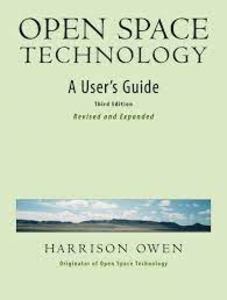
Open Space Technology
Open Space is a methodology for large groups to create their agenda discerning important topics for discussion, suitable for conferences, community gatherings and whole system facilitation
Goal
Open Space Technology can be used for strategic planning, needs analysis, conferences, product design, visioning, focus groups, systems analysis, architectural or ecological projects, race and ethnicity discussions, community partnerships, new directions for laboratory research, and much more.
Materials
Instructions
Participants convene in a circle with a basic theme to focus their efforts. The facilitator explains the few Open Space rules to guide the process. Members of the circle are invited to identify any issue connected to the theme for which they have genuine interest and are prepared to take some personal responsibility such as convening a discussion group.
Participants write their issue on a piece of paper, announce it to the group, pick a session time and place, and post the paper on the wall.
Eventually the wall fills up with issues and ideas for sessions. Everyone signs up for sessions important to them and off they go. Each session records its discussion and this creates a record of the proceedings. If appropriate, issues are prioritised and groups convene to discuss next steps, timelines, and point-persons before the end of the event.
After
Usual or Expected Outcomes: Learn and trust in this process, however, and by the end of a 2 1/2 day session you'll find that...- all issues of major importance will have been discussed
- everyone who wants to speak will be heard
- if appropriate, priorities and next steps will have been identified
- at the end of the process each participant will hold in their hand a complete record of the proceedings, including key discussion points, recommendations and action items
Background
Source: Harrison Owen
Open Space is a method for convening people for fully-participatory conferences, retreats, action planning and task work.
Participants co-create an agenda and lead their own discussion and action sessions in a dynamic way that invites interdisciplinary and inter-group thinking.
_________________________
It is not recommended to add Open Space into an event at the beginning and then move to another method / dynamic -- rather, it is recommended that if Open Space is to be part of (not the entire format for) an event it should be designed for the end section, such as a last day of a conference (for participants to process what they've learned, share ideas and resources and network).
_________________________
When your organization or community has a complex problem, you are completely out of ideas regarding a solution, you have a diversity of people that you can bring to the process, and the time for resolving this situation was yesterday --- This is a great time for Open Space. Participants emerge from the process invigorated, refreshed, and proud of their individual and collective accomplishments.
_________________________
The use of Open Space Technology has been effective since the mid-1980?s in a diversity of settings, cultures and countries. The method has been used by communities working towards peace, chemists designing new polymers, tribal and governmental leaders planning land use, community advocates and local government designing literacy programs, conference organizers holding action conferences, architects designing pavilions for the Olympics, an entire town having a simultaneous discussion town meeting, and neighbors helping each other rebuild and heal after times of war.
_________________________
This tool can be utilized by groups of 5 to over 2000 and the dynamics and the results are always the same: input from stakeholders at all levels, new ways of thinking and working, large amounts of work done rapidly, bringing perceived competitors together on issues and projects, organizational flexibility, interdepartmental or intercommunity teamwork, a sense of accomplishment and a feeling of passion and energy for the challenges ahead.

Comments (2) (5.0 avg / 2 ratings)
Organising an Open Space event online needs thorough planning and execution. I recommend to learn from experienced Open Space practitioners who are delivering OS online using various conference and meeting platforms. Search the web for Open Space events, and learn from participating. I recommend to explore the platform Qiqochat. It works like a "container" in which you organize the open space market in conjunction with ZOOM. You don't need your own ZOOM account. The founders are very supportive to assist you in setting up larger conferences and there is a peer group network and a youtube channel with examples how to work with this platform. This video is a good introduction to Qiqpchat: https://www.youtube.com/watch?v=fRlgh04nzXY
If the small groups have facilitation skills, this can be transformational. However, if the small groups don't have facilitation skills, they can be unproductive.